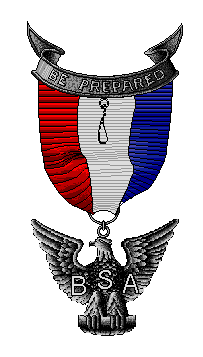|
The FReeper Canteen Presents…..
~ National Navajo Code Talkers Day! ~

Chairman of the Joint Chiefs of Staff, Gen Peter Pace (left), US Marine Corps, talks with Navajo Code Talkers after they presented him with a Navajo blanket in the Pentagon on Aug 10, 2007. Code Talkers were Native American Marines who served in World War II and developed a communications code based on their native language. DoD photo by Staff Sgt D Myles Cullen, US Air Force. (Released)
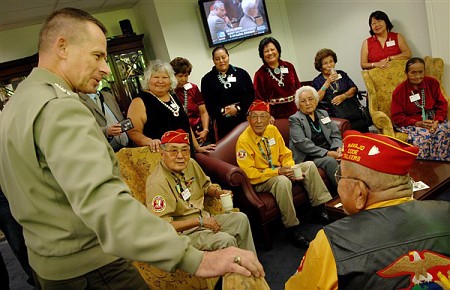
      
Canteen Mission Statement
Showing support and boosting the morale of
our military and our allies’ military
and family members of the above.
Honoring those who have served before.

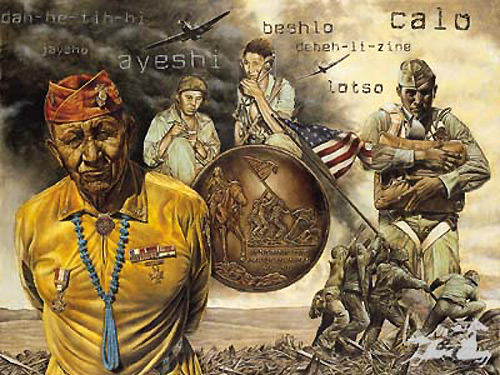
VISIONS OF VALOR
In recognition of the Navajo Code Talkers, by David C Behrens
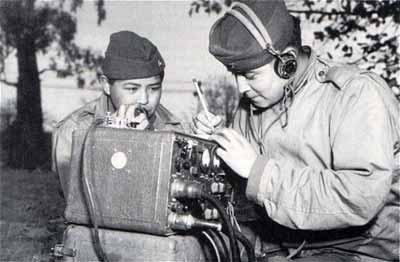
Pfc. Preston Toledo and Pfc. Frank Toledo, Navajo cousins in a Marine artillery regiment in the South Pacific, relay orders over a field radio in their native tongue. Navajo code-talkers help the U.S. seize Iwo Jima: Navajo Indians radio a message during fighting in the Pacific. The Navajo code-talker teams were used to relay radio and phone messages in their native dialect during combat operations. The method was fast and indecipherable to enemy eavesdroppers. At the time of World War II, the Navajo language was understood by fewer than 30 non-Navajos. The code was never broken by the Japanese, and its security has been credited with contributing significantly to the seizure of Iwo Jima in 1945. Approximately 400 Navajo code-talkers served with the six U.S. Marine divisions during the war.

Jim Croce ~ Time In A Bottle
Don Williams ~ You’re My Best Friend
Carole King ~ Sweet Seasons
Bob Wills ~ My Adobe Hacienda
Artie Shaw ~ The Last Two Weeks In July

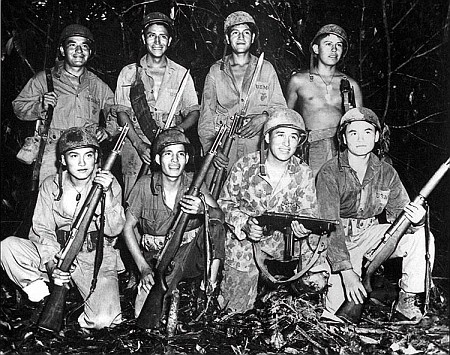
Guadalcanal, Tarawa, Peleliu, Iwo Jima: the Navajo code talkers took part in every assault the U.S. Marines conducted in the Pacific from 1942 to 1945. They served in all six Marine divisions, Marine Raider battalions and Marine parachute units, transmitting messages by telephone and radio in their native language — a code that the Japanese never broke.
The idea to use Navajo for secure communications came from Philip Johnston, the son of a missionary to the Navajos and one of the few non-Navajos who spoke their language fluently. Johnston, reared on the Navajo reservation, was a World War I veteran who knew of the military's search for a code that would withstand all attempts to decipher it. He also knew that Native American languages — notably Choctaw — had been used in World War I to encode messages.
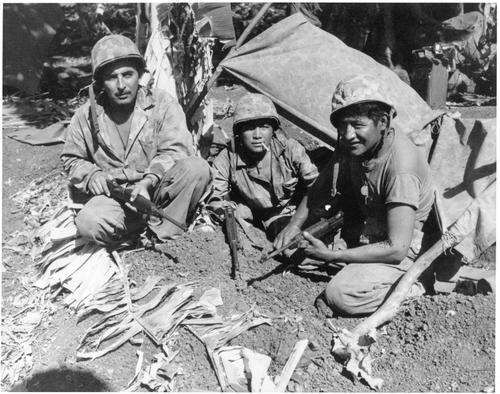
Navajo communications men with the Marines on Saipan landed with the first assault waves to hit the beach. Left to right: Cpl. Oscar B. Iithma of Gallup, N.M., Pfc. Jack Nez of Fort Defiance, Arizona, and Pfc. Carl C. Gorman, Chinle, Arizona.
Johnston believed Navajo answered the military requirement for an undecipherable code because Navajo is an unwritten language of extreme complexity. Its syntax and tonal qualities, not to mention dialects, make it unintelligible to anyone without extensive exposure and training. It has no alphabet or symbols, and is spoken only on the Navajo lands of the American Southwest. One estimate indicates that less than 30 non-Navajos, none of them Japanese, could understand the language at the outbreak of World War II.
Early in 1942, Johnston met with Major General Clayton B. Vogel, the commanding general of Amphibious Corps, Pacific Fleet, and his staff to convince them of the Navajo language's value as code. Johnston staged tests under simulated combat conditions, demonstrating that Navajos could encode, transmit, and decode a three-line English message in 20 seconds. Machines of the time required 30 minutes to perform the same job. Convinced, Vogel recommended to the Commandant of the Marine Corps that the Marines recruit 200 Navajos.

Sonny James ~ It’s The Little Things The Eagles ~ Seven Bridges Road
Roy Clark ~ Thank God & Greyhound
Nilsson ~ Without You
Don Rich ~ Cajun Fiddle

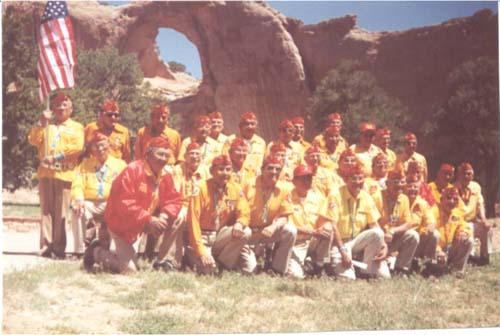
In May 1942, the first 29 Navajo recruits attended boot camp. Then, at Camp Pendleton, Oceanside, California, this first group created the Navajo code. They developed a dictionary and numerous words for military terms. The dictionary and all code words had to be memorized during training.
Once a Navajo code talker completed his training, he was sent to a Marine unit deployed in the Pacific theater. The code talkers' primary job was to talk, transmitting information on tactics and troop movements, orders and other vital battlefield communications over telephones and radios. They also acted as messengers, and performed general Marine duties. Praise for their skill, speed and accuracy accrued throughout the war. At Iwo Jima, Major Howard Connor, 5th Marine Division signal officer, declared, "Were it not for the Navajos, the Marines would never have taken Iwo Jima." Connor had six Navajo code talkers working around the clock during the first two days of the battle. Those six sent and received over 800 messages, all without error.
The Japanese, who were skilled code breakers, remained baffled by the Navajo language. The Japanese chief of intelligence, Lieutenant General Seizo Arisue, said that while they were able to decipher the codes used by the U.S. Army and Army Air Corps, they never cracked the code used by the Marines. The Navajo code talkers even stymied a Navajo soldier taken prisoner at Bataan. (About 20 Navajos served in the U.S. Army in the Philippines.) The Navajo soldier, forced to listen to the jumbled words of talker transmissions, said to a code talker after the war, "I never figured out what you guys who got me into all that trouble were saying." In 1942, there were about 50,000 Navajo tribe members. As of 1945, about 540 Navajos served as Marines. From 375 to 420 of those trained as code talkers; the rest served in other capacities. Navajo remained potentially valuable as code even after the war. For that reason, the code talkers, whose skill and courage saved both American lives and military engagements, only recently earned recognition from the Government and the public.
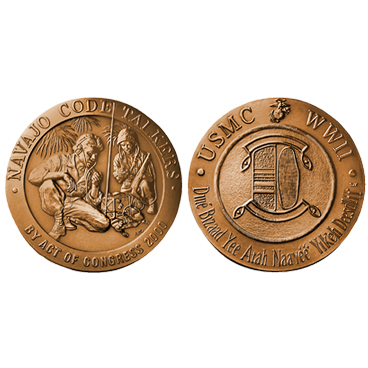
CODE TALKER MEDAL
On July 26, 2001, President George W. Bush presented these golden medals to honor the 29 Navajo Code Talkers of World War II. In a separate ceremony that fall, each Navajo who trained and qualified as a Code Talker, or a surviving family member, have been presented a silver medal. The Navajo Code Talkers played a vital role in the World War II Allies' victory in the Pacific. Using a code based on the complex Navajo language, the Code Talkers were able to transmit and decode in 20 seconds a message that would have taken a machine 30 minutes to decipher. The code was also impossible for the Japanese to break because it required decryption by Navajo speakers, none of whom were available to the Japanese. Many who fought in the War believe that the Allies would never have prevailed at Iwo Jima - or in other crucial battles were it not for theNavajo Code Talkers.

Please remember that The Canteen is here to support
and entertain our troops and veterans and their families,
and is family friendly.
|
|
|
